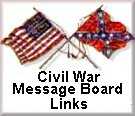After Abraham Lincoln's election on November 6, 1860, communities across Georgia and the South intensified their recruiting efforts in anticipation of possible conflict. Existing militia units filled with volunteers, and new units popped up throughout the state.
Not every unit was having an easy time filling its ranks. In the town of Sandersville, members of the Washington Rifles were dismayed that their company was not yet at full strength. Deciding that a good scolding was in order, a committee drafted a letter to the populace, which appeared in the November 20 edition of the Sandersville Central Georgian:
To the People of Washington County:
The undersigned were appointed a committee to address you in behalf of the Washington Rifles. As the Rifles stand alone, it would be naturally supposed that out of a regiment which would muster more than a thousand efficient men, at least one in ten would lead them to sustain one volunteer corps. The result, however, does not justify this opinion; and the Washington Rifles as a Company, has the mortification of seeing in other counties large and flourishing volunteer companies—while old Washington can scarcely muster fifty men willing efficiently to serve the State.
While we would not impugn the patriotism of the old, or the gallantry and bravery of the young, need, hundreds would be found willing to serve, of what use in a time of war would be an undrilled militia? All experience has shown, that a course of military training is absolutely necessary to perfect the soldier, and although the universal use of fire arms—to which our youth from infancy are accustomed—makes them, individually, formidable, and perhaps invincible behind entrenchments. Yet in the open field, it is well known that the disciplined valor of a few, can accomplish more than that of four times their number of inexperienced recruits. To render efficient service to the country, then, the soldier must be trained—he must be drilled in the use of his weapons—trained to understand his duty, and how best to perform it. This is not the work of a day, though much may be accomplished in a short time. Usually, however, months of patient, daily training are found necessary to perfect the new recruit in company and regimental drill, without which he is unreliable in the field.
In view of the unsettled condition of our country, and of the gathering storm, which may burst in rain upon our heads, does not the voice of patriotism call upon all to prepare for the conflict—and shall Georgia call and Washington not answer? or shall our rights demand our service in the field, and we be unprepared for the conflict? Patriotism and honor alike forbid.
In behalf of our corps, we invoke the aid of our young countrymen—we invite you to join our ranks to aid us by your co-operation—to you your country looks for protection, to the youthful, the gallant, the brave! Will you be laggard? Will you shrink from the conflict? Will you prefer inglorious ease? Shall your country call in vain? Sons of Revolutionary sires, shall your country’s call be unheeded?
To another class of our fellow-citizens we address ourselves. To you who, having a large interest at stake at home, are disqualified for the field—we appeal to you to assist. There are young men who would enlist, but are unable to uniform themselves. It is your duty to assist them. Let each one of you uniform a young man of character, and the Washington Rifles will soon number a hundred or more efficient men, and be an honor to the county, whose name it bears, and whose interest it will ever be willing to protect and defend.
When we consider the means which are employed to disturb the peace of the South; when we see a religious fanaticism, even the most relentless, which would plunge our country into all the horrors of a servile war, deluging our peaceful land with blood, and resulting in the destruction of a race now peaceful, contented and happy, and upon whose labor the happiness of millions of the human race depend, self interest as well as patriotism demands that we be prepared to protect ourselves, and be prepared to meet and repel aggression at the threshold. Your fellow citizens,
J. R. SMITH
B. D. EVANS,
Committee.
Thursday, November 18, 2010
Subscribe to:
Post Comments (Atom)
.jpg)










No comments:
Post a Comment